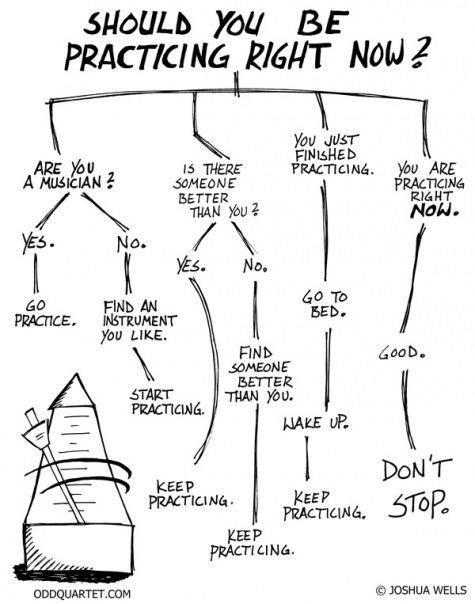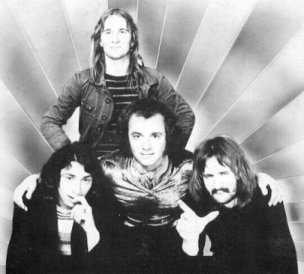How to get the most from your guitar practice, (and stop wasting your time)
The Art of Musical Practice By Pete Sklaroff
As a change of pace from the regular technique and theory based lessons I’ve posted here, I thought that I’d share a few personal thoughts on practicing the guitar, as this is probably the most common topic of conversation I have with students and is clearly a major concern for many players.
 A good number of my students have discussed their problems with not only finding the time to practice guitar but also actually achieving tangible results from it. In a world where almost everybody seems pushed for time within a ‘busy lifestyle’ – juggling family, work and the myriad of other time pressures, it can be difficult to find an opportunity to really sit down and advance your playing so here are my brief thoughts on this, which I hope you find helpful.
A good number of my students have discussed their problems with not only finding the time to practice guitar but also actually achieving tangible results from it. In a world where almost everybody seems pushed for time within a ‘busy lifestyle’ – juggling family, work and the myriad of other time pressures, it can be difficult to find an opportunity to really sit down and advance your playing so here are my brief thoughts on this, which I hope you find helpful.
The Guitar Practice Environment
Instead of beginning with a list of scales, arpeggios and repertoire to practice, I would like to initially discuss where you practice (i.e. your practice environment) as this really does have a major effect on the outcome of your practice regime in my experience.
For myself, if I want to really concentrate on something, I want NO distractions whatsoever and I switch off everything that would distract me (and I mean everything!) No Internet or personal computer, no mobile phones, turn down the home phone ringer and eliminate any additional ‘sound pollution’ that you can. This is often far easier to say than to actually achieve, but it is essential in my view, as these days we have so many (especially technological) distractions that just finding a quiet space to work on your guitar playing can be quite difficult at times.

Do we really need to practice 10 hours a day?
I also advocate practicing without an amp for around 70% of your practice session as well, as I find that sometimes playing through an amp in itself brings distractions regarding sound/tone and I generally work better without using an amplifier, especially for the really ‘high concentration’ material.
As regards any external devices I might use to aid my practice, I generally work with a standalone metronome for the most part if I need to work on time/rhythm and leave computer generated play-a-longs for when I’m winding down or just want to have some musical fun. This way I can just concentrate on musical specifics without additional time being spent on searching for audio files or other items on a hard drive. It is very easy to get distracted this way.
Keeping a notebook of your guitar practice schedule is also particularly helpful I find. This way you can monitor the progress of not only what you are working on, but also how often you are practicing it during the week. It also helps prevent your mind wandering when you practice.
What Should I Practice?
I get asked this question a lot too by my students and my answers are always based around what they are trying to achieve in their playing development. Simply saying that you would like to be a ‘better player’ is not enough in my book, (and very difficult to work towards without some realistic and achievable goals) as you need to be specific so that you can actually set targets and more importantly achieve them.
To ascertain what you need to work on, you first need to examine what you can currently achieve on the instrument and where this is in relationship to your future aspirations as a musician. It really helps to write some goals down for this if you can. If for example, you are trying to improve your improvisational skills, you could examine which pieces cause you more difficulty in terms of changing scales, negotiating the harmony and applying vocabulary or arpeggios etc. and then focus on working on them rather than playing tunes you already know well.
I also always recommend that students work on relatively small areas of study to begin with, as trying to wade through large amounts of new information usually just results in frustration and half-learnt concepts, which are then often quickly forgotten.
Once you’ve set your goals (which could be divided up into short, medium and long term goals) you then have a clear idea of what you want to do guitar practice on and by setting achievable targets you will make much better progress. Let us now examine this in a bit more detail:
If you are struggling to develop as an improviser for example, you might want to consider what kind of soloist you are aiming to be. If Jazz Rock/Fusion is your focus, then that genre has some quite specific areas of study that you will need to work on as opposed to say, a Rock/Metal guitarist who might have slightly different goals in terms of technique and improvisational vocabulary etc.
How Should I Practice Guitar?
My view on practice methodology is that you need to first and foremost practice regularly (i.e. every day) and not just cram everything in on a weekend when your other responsibilities are perhaps diminished somewhat from a normal working day in the week. If therefore you can only manage say one hour a day guitar practice on average, then it’s best to spread the time over the week in my view than try to sit down for a marathon session on a Sunday afternoon.
You also need to be clear on what you are trying to achieve in each practice session. If your goal is to be able to improvise fluently with one particular scale for example, then you need to really know it VERY well. Let me explore this in more detail for you:

Sometimes we simply need to focus
Let us say (for the sake of argument) you are wishing to become more fluent with different scales and modes (a medium to long term goal) Start by asking yourself a few questions about your current modal/scale knowledge. By answering these honestly, you have an almost instant practice schedule right in front of you.
1) Can you play at least five separate fingerings (in one or two octaves) of the scale/mode you are trying to develop and without hesitation?
3) Can you employ various common rhythms with the scale/mode without losing your place and having to re-finger the scale?
4) Can you play all the diatonic triads and seventh chords from the scale/mode without hesitation?
5) Can you play the scale or mode along a single string as well as ‘in position’?
6) Can you readily change keys (modulate) with these scales without hesitation?
If you can honestly answer ‘yes’ to all these questions then you can safely move on to other material but if you cannot, or some areas are weaker than others are, then you know instantly where you work needs to be focused. You will see I have written ‘without hesitation’ a lot here and I am sure you will understand why. Everything needs to be instantly at your fingertips.
Summary
Effective practice requires consistent self-discipline and an ability to be very honest with yourself as well. It is very easy to fool yourself into believing that you have a good command of a particular approach or concept, but then subsequently realize that your knowledge is in fact rather weak.
This need not be a depressing experience either. Most high-level players have had to really work hard on becoming fluent on the instrument and their apparent ease in playing is without doubt the product of many thousands of hours of concentrated guitar practice.
If you really apply yourself you will get major results, provided you are clear on what you are working on and how you want it too sound.
It’s that simple. It really is. Now go and practice! – Pete

Pete Sklaroff
Pete Sklaroff
Pete Sklaroff is the former Assistant Head of Music and Head of Jazz Studies at Leeds College of Music in West Yorkshire (where he taught for over 20 years) and he now works freelance as a professional guitarist, session musician, clinician and music educator/guitar tutor in the UK. His career spans over 25+ years as a professional musician and he has toured and recorded extensively in that time. www.petesklaroff.com
“The artists you work with, and the quality of your work speaks for itself.”
Tommy Emmanuel
© Copyright Fundamental Changes Ltd 2024
No.6 The Pound, Ampney Crucis, England, GL7 5SA
